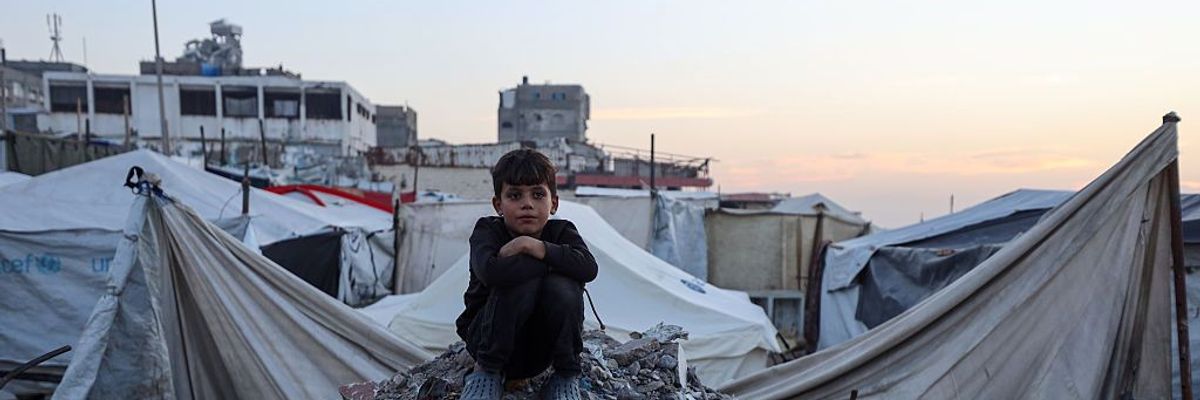
Palestinian children attend an entertainment event and a film screening as part of the Gaza Children's Film Festival held on the rubble of the Beach Services Club in Gaza City, on November 23, 2025.
Israeli Assault Has Plunged Gaza Into Worst Economic Collapse Ever Recorded: UN Report
"In an optimistic scenario... it will still take several decades for Gaza to return to pre-October 2023 welfare levels."
A United Nations report claims that Israel's assault on Gaza has led to "the most severe economic crisis ever recorded," with nearly seven decades' worth of economic development wiped out over the span of two years.
The report, which was released on Monday by the UN Conference on Trade and Development (UNCTAD), found that all 2.3 million people in the exclave now live below the poverty line, with per-capita gross domestic product falling to just $161, one of the lowest figures in the world.
Additionally, the report found that the unemployment rate in Gaza was as high as 80%, while inflation in the exclave surged to nearly 240%, as the Israeli military blockade caused a widespread famine by preventing basic necessities from reaching Gaza residents.
One particularly striking metric flagged by the report was the precipitous drop of night-time luminosity, which fell by 73% in Gaza between September 2023 and May 2025, an indication that Israel had completely destroyed most of the exclave's power infrastructure and left the vast majority of its people without electricity.
In fact, a map showing the presence of night-time electric lights in Gaza in May 2025 showed that the only areas in the exclave that had power were ones in the very south on the border with Egypt and in the very north on the border with Israel.
The UNCTAD report also painted a very grim picture of what it will take to rebuild Gaza.
"In an optimistic scenario of double-digit growth rates facilitated by a significant level of foreign aid, it will still take several decades for Gaza to return to pre-October 2023 welfare levels," the report said. "The international community should act to ensure a permanent ceasefire immediately and, once recovery commences, prioritize life-saving interventions, including access to essential healthcare, both physical and mental, clean water, and the restoration of basic infrastructure."
While Gaza suffered the most devastation as a result of Israeli military operations, the UNCTAD report noted that the West Bank was also undergoing significant economic distress.
Specifically, the report said that the West Bank is suffering through "its most severe economic downturn on record, driven by heightened insecurity, movement and access restrictions, and the loss of productive opportunities in all sectors of the economy."
Israel's war in Gaza, which began after Hamas launched a surprise attack inside Israel on October 7, 2023 that killed nearly 1,200 Israelis, has so far killed an estimated 70,000 Palestinians. A report released by Physicians for Human Rights–Israel last week also estimated that nearly 100 Palestinian detainees have died while being held in Israeli custody.
An Urgent Message From Our Co-Founder
Dear Common Dreams reader, The U.S. is on a fast track to authoritarianism like nothing I've ever seen. Meanwhile, corporate news outlets are utterly capitulating to Trump, twisting their coverage to avoid drawing his ire while lining up to stuff cash in his pockets. That's why I believe that Common Dreams is doing the best and most consequential reporting that we've ever done. Our small but mighty team is a progressive reporting powerhouse, covering the news every day that the corporate media never will. Our mission has always been simple: To inform. To inspire. And to ignite change for the common good. Now here's the key piece that I want all our readers to understand: None of this would be possible without your financial support. That's not just some fundraising cliche. It's the absolute and literal truth. We don't accept corporate advertising and never will. We don't have a paywall because we don't think people should be blocked from critical news based on their ability to pay. Everything we do is funded by the donations of readers like you. Will you donate now to help power the nonprofit, independent reporting of Common Dreams? Thank you for being a vital member of our community. Together, we can keep independent journalism alive when it’s needed most. - Craig Brown, Co-founder |
A United Nations report claims that Israel's assault on Gaza has led to "the most severe economic crisis ever recorded," with nearly seven decades' worth of economic development wiped out over the span of two years.
The report, which was released on Monday by the UN Conference on Trade and Development (UNCTAD), found that all 2.3 million people in the exclave now live below the poverty line, with per-capita gross domestic product falling to just $161, one of the lowest figures in the world.
Additionally, the report found that the unemployment rate in Gaza was as high as 80%, while inflation in the exclave surged to nearly 240%, as the Israeli military blockade caused a widespread famine by preventing basic necessities from reaching Gaza residents.
One particularly striking metric flagged by the report was the precipitous drop of night-time luminosity, which fell by 73% in Gaza between September 2023 and May 2025, an indication that Israel had completely destroyed most of the exclave's power infrastructure and left the vast majority of its people without electricity.
In fact, a map showing the presence of night-time electric lights in Gaza in May 2025 showed that the only areas in the exclave that had power were ones in the very south on the border with Egypt and in the very north on the border with Israel.
The UNCTAD report also painted a very grim picture of what it will take to rebuild Gaza.
"In an optimistic scenario of double-digit growth rates facilitated by a significant level of foreign aid, it will still take several decades for Gaza to return to pre-October 2023 welfare levels," the report said. "The international community should act to ensure a permanent ceasefire immediately and, once recovery commences, prioritize life-saving interventions, including access to essential healthcare, both physical and mental, clean water, and the restoration of basic infrastructure."
While Gaza suffered the most devastation as a result of Israeli military operations, the UNCTAD report noted that the West Bank was also undergoing significant economic distress.
Specifically, the report said that the West Bank is suffering through "its most severe economic downturn on record, driven by heightened insecurity, movement and access restrictions, and the loss of productive opportunities in all sectors of the economy."
Israel's war in Gaza, which began after Hamas launched a surprise attack inside Israel on October 7, 2023 that killed nearly 1,200 Israelis, has so far killed an estimated 70,000 Palestinians. A report released by Physicians for Human Rights–Israel last week also estimated that nearly 100 Palestinian detainees have died while being held in Israeli custody.
A United Nations report claims that Israel's assault on Gaza has led to "the most severe economic crisis ever recorded," with nearly seven decades' worth of economic development wiped out over the span of two years.
The report, which was released on Monday by the UN Conference on Trade and Development (UNCTAD), found that all 2.3 million people in the exclave now live below the poverty line, with per-capita gross domestic product falling to just $161, one of the lowest figures in the world.
Additionally, the report found that the unemployment rate in Gaza was as high as 80%, while inflation in the exclave surged to nearly 240%, as the Israeli military blockade caused a widespread famine by preventing basic necessities from reaching Gaza residents.
One particularly striking metric flagged by the report was the precipitous drop of night-time luminosity, which fell by 73% in Gaza between September 2023 and May 2025, an indication that Israel had completely destroyed most of the exclave's power infrastructure and left the vast majority of its people without electricity.
In fact, a map showing the presence of night-time electric lights in Gaza in May 2025 showed that the only areas in the exclave that had power were ones in the very south on the border with Egypt and in the very north on the border with Israel.
The UNCTAD report also painted a very grim picture of what it will take to rebuild Gaza.
"In an optimistic scenario of double-digit growth rates facilitated by a significant level of foreign aid, it will still take several decades for Gaza to return to pre-October 2023 welfare levels," the report said. "The international community should act to ensure a permanent ceasefire immediately and, once recovery commences, prioritize life-saving interventions, including access to essential healthcare, both physical and mental, clean water, and the restoration of basic infrastructure."
While Gaza suffered the most devastation as a result of Israeli military operations, the UNCTAD report noted that the West Bank was also undergoing significant economic distress.
Specifically, the report said that the West Bank is suffering through "its most severe economic downturn on record, driven by heightened insecurity, movement and access restrictions, and the loss of productive opportunities in all sectors of the economy."
Israel's war in Gaza, which began after Hamas launched a surprise attack inside Israel on October 7, 2023 that killed nearly 1,200 Israelis, has so far killed an estimated 70,000 Palestinians. A report released by Physicians for Human Rights–Israel last week also estimated that nearly 100 Palestinian detainees have died while being held in Israeli custody.

